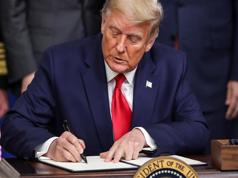China retaliates as Trump trade tariffs take effect

BEIJING/WASHINGTON – China said it will impose an 84% tariff on imports from the United States starting Thursday, up from a previously announced 34%. The move, announced by China’s Ministry of Finance on Wednesday, marks a new escalation in the global trade war started by former US President Donald Trump.
At the same time, Trump’s “reciprocal” tariffs on dozens of countries took effect early Wednesday, including a 104% tariff on Chinese goods. The European Union is also preparing its own retaliatory measures for the day.
Trump’s punitive tariffs – aimed at ending America’s chronic trade deficit – have shaken the decades-old international trading system, stoked fears of a global recession and wiped trillions of dollars off the market value of major companies.
Global markets tumble
World financial markets were rocked as the 104% tariff took effect. A sharp sell-off in US bonds sparked fears that foreign investors were pulling out of US assets.
The situation worsened after China retaliated. European stocks continued to fall, oil prices fell to a four-year low and US stock index futures plunged.
When announcing the new tariffs, China's Ministry of Finance said:
"The US tariff escalation is a serious mistake, violating China's legitimate rights and interests and undermining the rules-based multilateral trade order."
Beijing also imposed restrictions on 18 US companies, mainly operating in the defense sector, bringing the total number of sanctioned companies to about 60.
US slams China
Responding to China's move, US Treasury Secretary Scott Bessent called Beijing's retaliation with 84% tariffs a "failure" and said:
I think it's unfortunate that China doesn't really want to negotiate, because they're the worst offenders in the international trading system," he told Fox Business Network.
This week, the stock market has been in a state of turmoil, wiping out trillions of dollars in stock value and causing severe damage to commodities and emerging markets.
Even US Treasury bonds - considered a safe haven - have been sold off sharply, causing the dollar to weaken against other major currencies.
A war with no way out
Mr. Ting Lu, chief economist at Nomura, commented:
"The US and China are caught in an unprecedented and extremely costly game of chicken. It seems that neither side wants to make concessions."
In response to the tariffs from China, Mr. Trump doubled tariffs on imports from Beijing – from 54% to 104% in just one week.
The White House has not yet commented on China's latest retaliation.
EU to strike back
China warned earlier in the day that its trade surplus with the US is inevitable and said it has the "will and means" to continue the fight if the US continues to raise tariffs.
Meanwhile, the Chinese yuan is under sharp downward pressure, with the offshore rate hitting a record low. However, sources revealed that the Chinese central bank has asked state banks to stop buying dollars and will not allow the yuan to fall further.
Since Mr. Trump announced the tariffs on April 2, the S&P 500 has recorded its biggest drop since its inception in the 1950s.
The Global pharmaceutical stocks also sold off broadly after Trump reiterated plans to impose “substantial” tariffs on imports in the industry.
Trump maintains tough tone
At a Republican event in Washington on Tuesday, Trump said:
I’ll tell you the truth – countries are calling us, kissing my ass. They’re begging for a deal. ‘Please, sir, make a deal. I’ll do anything, I’ll do anything sir,’” Trump sarcastically echoed.
On the Truth Social platform, he wrote:
This is a GREAT time to move your COMPANY to the USA. NO TARIFFS, and almost immediate energy approvals. No environmental delays. DON’T WAIT – ACT NOW!”
EU, China, Canada strike back
The European Union is also expected to pass its first round of retaliatory tariffs on Wednesday, targeting a range of US imports. The list includes motorcycles, poultry, fruit, clothing, wood and even dental floss – with additional duties of up to 25%, according to documents seen by Reuters.
